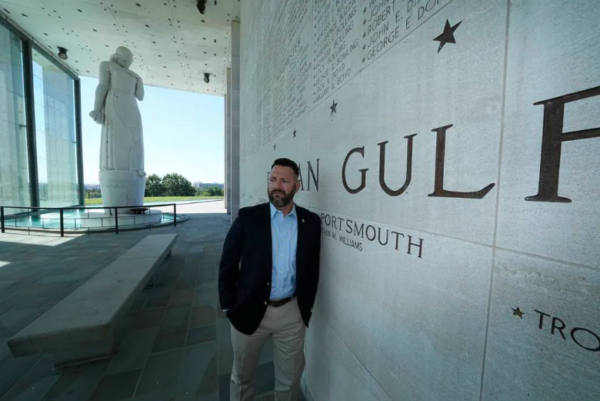
James Rudisill in 2023 at Richmond’s Virginia War Memorial (Photo: Steve Helber/AP)
On Tuesday, the U.S. Supreme Court ruled in favor of Army combat Veteran James Rudisill, who was in a legal battle against the VA regarding his entitlement to education benefits under both the Montgomery GI Bill and Post 9/11 GI Bill.
In a 7-2 ruling, the Court supported Rudisill’s contention that he deserved benefits from both programs, totaling up to 48 months, rather than being restricted by the individual time constraints of each bill.
Justice Ketanji Brown Jackson, delivering the majority opinion, stated that Rudisill had rightfully earned separate entitlements to educational benefits through his service in the military, spanning nearly eight years across multiple periods. Jackson emphasized that Veterans, like Rudisill, who accumulate benefits under both the Montgomery and Post-9/11 GI Bills should be entitled to receive benefits from both programs.
Rudisill’s military journey involved serving as both an enlisted soldier and later as an Army officer. During his service, he used 25 out of 36 months of his Montgomery GI Bill eligibility to pursue college education. Subsequently, he enlisted in the Post-9/11 GI Bill upon returning to the Army but did not use it during his active duty as an officer. Upon leaving the Army with the rank of captain, Rudisill intended to pursue further education at Yale Divinity School, aspiring to become an Episcopal priest and later rejoining the Army as a chaplain. He planned to finance his education using Post-9/11 benefits, believing he had 23 months remaining. However, the VA said that he was only eligible for 11 months under the program, leading to the legal dispute.
Rudisill’s argument rested on a Korean War-era law, contending that Veterans could combine benefits from multiple programs for a total of 48 months. In contrast, the federal government argued that Veterans eligible for both bills must choose one, with a combined maximum eligibility of 36 months. Rudisill’s legal team stated the potential impact of the decision, suggesting it could affect approximately 1.7 million Veterans, although the VA disputed this figure, citing a lack of similar cases.
In response to the Supreme Court’s decision, Rudisill expressed gratitude for the opportunity to advocate on behalf of fellow Veterans who had encountered similar challenges in accessing promised benefits post-service. The ruling is hailed as a victory for fairness and accountability within the Veteran community.
The VA acknowledged the ruling and pledged to review its implications, reaffirming its commitment to assisting Veterans in accessing education benefits. The GI Bill, a cornerstone of Veteran education support, is significant in facilitating successful post-military careers by minimizing financial barriers to education.
While the statute prohibits concurrent use of GI Bill programs, the introduction of the Post-9/11 GI Bill during a period of overlap with the Montgomery GI Bill led to complexities in eligibility. The Supreme Court’s ruling clarifies that Veterans eligible for both programs should not be unduly restricted in accessing their entitled benefits.
Justice Brett Kavanaugh provided a separate concurring opinion, while Justices Clarence Thomas and Samuel Alito dissented from the majority decision. The legal team representing Rudisill, including attorneys from Troutman Pepper and Dominion Energy, hailed the verdict as a significant victory for Veterans’ rights, affirming its enduring impact on the Veteran community.













